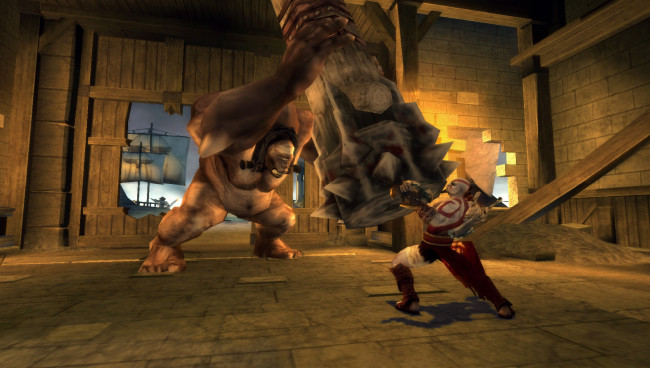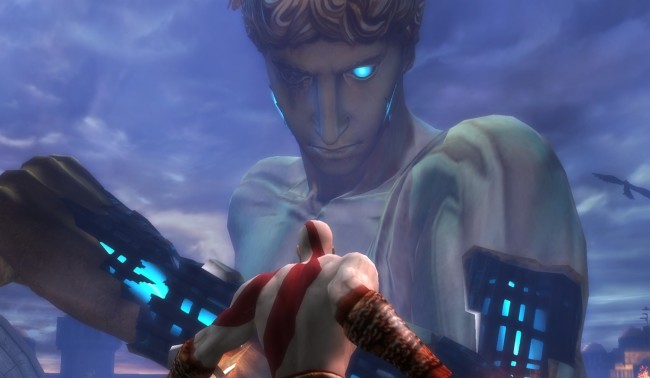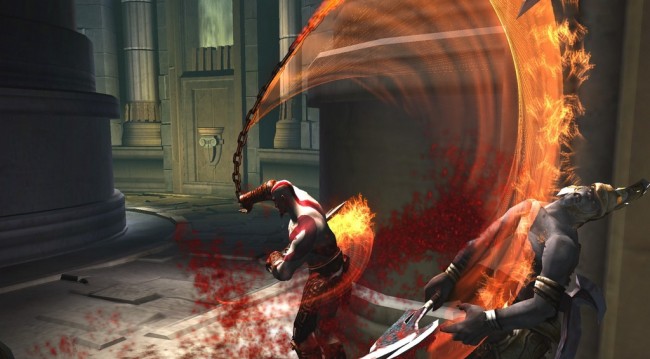God of War Dissection: Myth and Story
2009, January 22nd 5:58 PMI'm afraid I've lied to you all.
In a previous entry I explained in depth why game worlds need to make sense – not just in terms of Game, but in terms of World. I claimed that your world needed to be consistent, to feel like a living, breathing, realistic location, not like it was summoned out of the ether to provide a backdrop for a half-naked Greek dude to violently slaughter things.
This is actually a load of horse hockey.
But it's important to realize when it's a load of horse hockey.

God of War. It's one of the more successful recent franchises. God of War 1 was a Playstation 2 game, in which you played Kratos, a half-naked Greek dude who violently slaughtered things. I'm going to assume I don't need to continue the joke here – you can probably figure out what God of War 2, God of War: Chains of Olympus, God of War: Betrayal, and the upcoming God of War 3 are about.
The important thing to realize about the God of War series, which sets it about as far away from Dead Space as is possible for it to be set, is that God of War is a myth. It's not about some average-Joe engineer, thrust into a terrifying situation against his will. It's about a living legend. Kratos, the Ghost of Sparta. Kratos, the Hand of the Gods. Kratos, the God of War. Kratos is the main character in a world which fundamentally revolves around him – he is Revenge, he is Fate, he is Destruction.
On top of that, Kratos is the main character in a game that is, itself, fundamentally about fate and gods. Scratch that – fundamentally about Fate and Gods. Both of those tend to bend the laws of probability around them. Unlikely things become expected when prophecy is involved. When Kratos makes his way through a half-destroyed forest of columns, swinging from one to another as they topple around him, we don't think "ha ha, how silly, why were they all so precariously balanced in the first place, this game sucks" – we think "this is a test, we will vanquish the test and fulfill our destiny". When you realize that half of the puzzles involve destroying large blocks of stone, thereby proving that the puzzle has never before in the history of the universe been solved, and that some of them actually rely on certain parts of the puzzle being age-worn and easily shatterable, we don't think "ha ha, are we seriously expected to believe that Kratos was the first one here?" – we think "see how everything falls into place! Truly, we are the chosen one, and we cannot be stopped!"

This wouldn't work in Dead Space. Dead Space is not a myth – Dead Space is a story. Isaac isn't a Chosen One. Isaac is an unfortunate man in an unfortunate situation. The world does not care if Isaac lives or dies – Isaac can be shredded by industrial machinery, or devoured by zombies, or simply freeze to a cold lonely death in space, and fundamentally, nobody in that game will care (besides, obviously, Isaac.) Isaac isn't being pushed through by the Forces of Fate, there is no greater being controlling his actions – he's just a guy, trying to survive.
And this, incidentally, is one of the curious things about Star Wars. Star Wars is a myth about a random guy. On one hand, it is a myth – Luke Skywalker is the Chosen One. But on the other hand, Luke Skywalker is just some backwards hick from Tatooine. Most of the time, Star Wars feels like a story about some poor teenage dude who's way, way, way in over his head. Luke gets his hand cut off. Han gets frozen in carbonite. Luke gets beat up. Luke gets dropped into a fighter cockpit and told "we're all counting on you!" and, holy shit, they're all counting on him! Even when Luke is being ridiculously badass and slaughtering dozens of stormtroopers, you kind of get the feeling he's not quite sure what he's doing here.
And then he ends up in the Emperor's quarters, and everything shifts a little . . . and suddenly it's not a story about Luke Skywalker, Desert Farmer, it's a myth about Luke Skywalker, Jedi Knight, and oh hey lookit that, there's a reactor vent in just the right spot. What a coincidence! Almost as if it were fated to happen.
I'm not entirely convinced that shift was intentional. I think it was a lucky accident, and that the writers never sat down and said "okay, and here we change from story into myth". I think they just wanted to throw the Emperor into a reactor core. If anything, this is what I want people to get out of this:

Myth is good. Story is good. But you have to understand which form you're writing, and why.
And for bonus credit:
Arguably, I lied to you again. Sorry. Figure out where, and explain why it doesn't matter. (You'll need to know one of the two games I talked about in order to do so.) I'll post more about this later.

